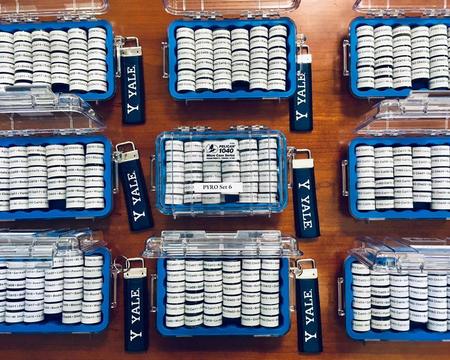Overview
 A series of well-characterized specimens, known as the Peabody-Yale Reference Obsidians (PYRO) sets, has been designed to aid with calibrating and assessing XRF data, including portable XRF (pXRF) measurements, for obsidian sourcing. Each of these ten matched sets consists of 35 specimens: 20 specimens for calibration and 15 specimens for evaluation. These sets include not only obsidians with common geochemical compositions (i.e., alkaline rhyolites) but also rarer ones (i.e., peralkaline rhyolitic, trachytic, and andesitic specimens, including East African Rift obsidians). When used as described, the PYRO sets are suitable to calibrate and evaluate XRF data for obsidians worldwide. A set can be borrowed following loan policies of the Peabody Museum of Natural History, which accessioned a set. Publishing all source information – from their names and GPS coordinates to the datasets used for the recommended values – not only allows the sets to be replicated by others but also fulfills the demands of scientific transparency. Their main purpose is facilitating collaborations and “big data” projects, and the PYRO sets were designed to complement existing protocols for calibration and evaluation. In short, the sets are intended as a tool for almost anyone (e.g., a student who borrows an instrument to source artifacts) to meet – and even exceed – experts’ practices involving transparency, accuracy, and reproducibility.
A series of well-characterized specimens, known as the Peabody-Yale Reference Obsidians (PYRO) sets, has been designed to aid with calibrating and assessing XRF data, including portable XRF (pXRF) measurements, for obsidian sourcing. Each of these ten matched sets consists of 35 specimens: 20 specimens for calibration and 15 specimens for evaluation. These sets include not only obsidians with common geochemical compositions (i.e., alkaline rhyolites) but also rarer ones (i.e., peralkaline rhyolitic, trachytic, and andesitic specimens, including East African Rift obsidians). When used as described, the PYRO sets are suitable to calibrate and evaluate XRF data for obsidians worldwide. A set can be borrowed following loan policies of the Peabody Museum of Natural History, which accessioned a set. Publishing all source information – from their names and GPS coordinates to the datasets used for the recommended values – not only allows the sets to be replicated by others but also fulfills the demands of scientific transparency. Their main purpose is facilitating collaborations and “big data” projects, and the PYRO sets were designed to complement existing protocols for calibration and evaluation. In short, the sets are intended as a tool for almost anyone (e.g., a student who borrows an instrument to source artifacts) to meet – and even exceed – experts’ practices involving transparency, accuracy, and reproducibility.
Publication
Read the peer-reviewed publication:
Frahm, E. 2019. Introducing the Peabody-Yale Reference Obsidians (PYRO) sets: Open-source calibration and evaluation standards for quantitative X-ray fluorescence analysis, Journal of Archaeological Science: Reports 27, 101957, doi.org/10.1016/j.jasrep.2019.101957
Science Direct • ResearchGate • Academia.edu
Borrowing a Set
The PYRO sets are intended to be freely available to researchers via a loan (i.e., a temporary physical transfer without an ownership transfer) arranged with the Yale University Archaeological Laboratories, where most sets will reside. The precise loan policies will likely be re ned over time; however, the guidelines reflect those of Yale’s Peabody Museum of Natural History. Specifically, the loan of a PYRO set will be subject to the following stipulations:
- Loans are made for non-commercial and scholarly purposes (i.e., without financial gain; e.g., a borrower cannot charge someone a fee to calibrate an instrument with a loaned PYRO set). A loaned set will only be sent to an accredited educational or research institution.
- Loan requests should be made in writing on institutional letterhead. A request should state the purpose of the loan, a brief project description, where and under whose responsibility a set would be housed while on loan, and the requested length of the loan period.
- A loan is made to institutions, not individuals. Students, postdoctoral scholars, and visiting researchers cannot enter into formal agreements on behalf of their institutions. Therefore, a permanent faculty member or department head should submit a request on their behalf and assume responsibility, as an institutional representative, for the care and custody of a set. A set cannot be transferred to a third party without prior written authorization.
- Specimens in the set should not be sampled, remounted, or altered in any way. Many, but not all, of the PYRO specimens have corresponding unmounted material that may be requested, if a sufficient amount is available, for destructive compositional analyses.
As an alternative to a formal loan, qualified researchers may analyze a PYRO using their instrument during a scheduled visit to the Yale University Archaeological Laboratories.
To aid the longevity of the PYRO sets, one set will be accessioned by the Peabody Museum of Natural History. Founded in 1866, the museum has been a center of geological, anthropological, and biological research at Yale for more than 150 years, and its collections will be available to scholars for the next 150 years. Hence, researchers also have the option to access a PYRO set as a visiting scholar at the Peabody Museum.